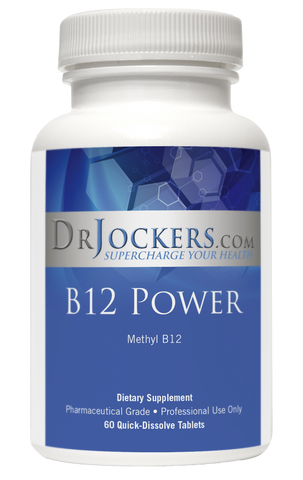
This is the form that I trust to get results with the clients I consult with after having seen it improve hundreds of pre/post lab tests.- Dr. Jockers
Let's discuss the key benefits of B12 Power:
Why choose B12 Power?

Why does Dr. Jockers recommend B12 Power?

Love the taste, the sublingual capability. This ranks right up there in quality like the rest of Dr Jockers products. - Sam
Read our customer reviews and you'll see why our clients agree these are...
Supplements You Can
TRUST
B12 Power

One of the most critical but overlooked vitamins in the world is vitamin B12. Vitamin B12 is involved in the metabolism of every cell of the body. It is crucial for processes such as DNA synthesis and energy production. B12 deficiencies are a hidden epidemic in our society. Boost your energy and mental clarity with high quality sources of Vitamin B12.
Together, B12 and folate reduce the metabolic end-product homocysteine. This pathway is responsible for the body’s entire sulfur-based detoxification system.

How is B12 synthesized?
Vitamin B12 can be obtained through its synthesis by intestinal flora, from animal-based or fortified foods, or from supplementation. Unlike most other water-soluble vitamins, vitamin B12 (4 to 6 mg) is bound to a protein and stored in the liver as methylcobalamin or 5’-deoxyadenosylcobalamin.
These are the coenzyme forms of B12 that are active in human metabolism. Reserve stores of B12 can become depleted due to poor dietary intake without supplementation, lack of intrinsic factors, or poor intestinal absorption.

What is the best form of B12?
Many vitamin B12 supplements on the market contain cyanocobalamin. The liver is able to convert a small amount of cyanocobalamin to methylcobalamin; however, methylcobalamin is the preferred form since it is the bioactive form and, therefore, better utilized.
In a research study, tissue retention of cobalamin was greater when using the methyl-form versus the cyano-form. This was exemplified by the fact that urinary excretion of methylcobalamin was one-third less than that of cyanocobalamin.[1]
Another point of interest regarding B12 supplementation is the commonly held belief that intramuscular injections of B12 are more effective than oral supplementation. In fact, oral supplementation is just as effective and carries the added benefits of lower cost and ease of administration (2, 3).
Methylation:
Methylcobalamin is required for the function of methionine synthase—the folate-dependent enzyme required for the synthesis of methionine, an amino acid, from homocysteine. Methionine, in turn, is required for the synthesis of S-adenosylmethionine (SAMe), a methyl group donor used in many biological methylation reactions, including the methylation of a number of sites within DNA and RNA.
As an example of its importance in homocysteine metabolism, one study showed that the addition of B12 to a folate regimen had a greater impact (7%) on homocysteine than did folate alone (4).
Neurological Health:
Methylcobalamin is necessary for the maintenance of a healthy nervous system. Chronic insufficiency can affect the spinal cord, peripheral nerves, optic nerve, and brain. This can be explained by methylcobalamin’s role as a cofactor in myelin synthesis; in methylation of the toxic byproduct homocysteine, which is thought to damage neurons; and in the synthesis of monoamine neurotransmitters, such as serotonin, dopamine, and norepinephrine (5, 6, 7).
Methylcobalamin is the preferred form of cobalamin supplementation for neurologic health, and experimental research indicates that methylcobalamin shows better transport to organelles within nerve cells than cyanocobalamin (8).
Red Blood Cell Formation:
Like folate, erythroblasts require vitamin B12 for proliferation during their differentiation. Insufficient B12 levels will contribute to purine and thymidylate synthesis inhibition, impaired DNA synthesis, and erythroblast apoptosis, resulting in ineffective erythropoiesis (9).
Sleep Support:
Methylcobalamin has been reported to affect the primary circadian rhythm associated with sleep (8,10). Research supports the role of methylcobalamin supplementation in modulating melatonin secretion, enhancing light sensitivity, normalizing circadian rhythms, and improving sleep-wake cycles (11, 12, 13).
Immune Health:
Research suggests an important role for B12 in immune system regulation. Human research demonstrated that methylcobalamin supplementation in patients with inadequate B12 levels improved CD4/CD8 ratio and NK cell activity, and augmented CD3-CD16+ cells, suggesting an important role in cellular immunity (14).
In other research, among homologues studied, methylcobalamin was shown to have the strongest antibody production enhancement in an in vitro system (14).
When does Dr. Jockers use this product?
I use this product when I see signs of B12 deficiency via blood testing or urine Organic acid testing. I have the individual take 1-2 mg daily (2-4 caps) for 30-90 days and then retest to see where the new ranges are.
If you believe you may have a B12 deficiency, then I would suggest speaking to a healthcare practitioner and/or getting functional testing for this. If you know you have a B12 deficiency, then this product in the dosage range listed above is the best way to raise your levels.

What is the recommended dosage?
Normal Dosage: 1 capsule – 1x daily (away from meals- take 1-2 hours before or after a meal)
Advanced Dosage: 1 capsule – 2x daily (away from meals- take 1-2 hours before or after a meal)
When introducing a new supplement, we recommend taking the lowest dose for 2-3 days. As tolerated, increase the dose until you have reached the recommended normal or advanced guidelines. Reduce to a tolerable dosage if adverse effects occur.
Select Your Options & Add to Cart
† These statements have not been evaluated by the Food and Drug Administration.
This product is not intended to diagnose, treat, cure or prevent any disease.









